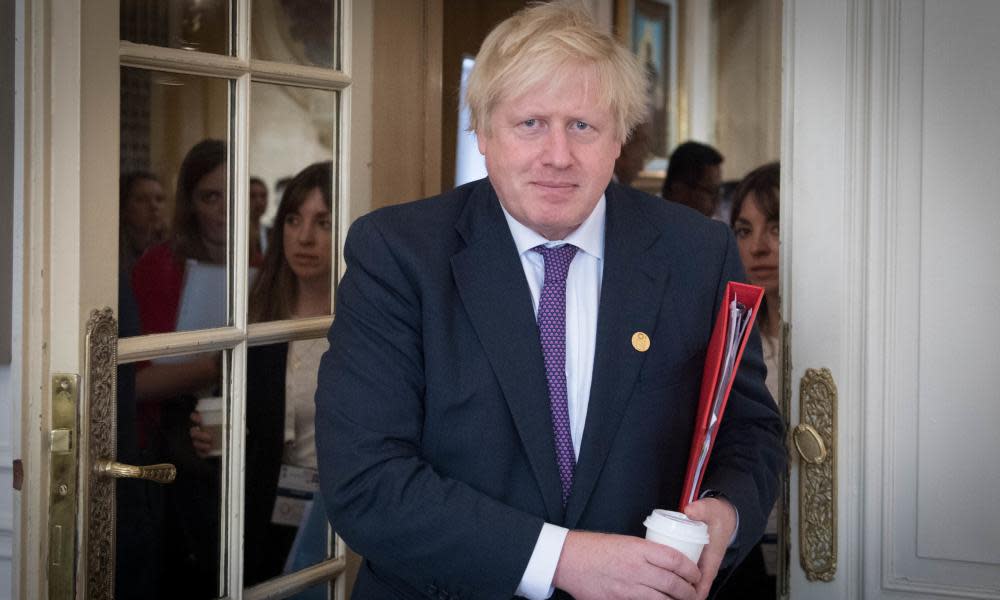Boris Johnson hints at tougher action against Russian oligarchs

Boris Johnson has hinted that the UK could seek to take tougher action against Russian oligarchs in the wake of the poisoning of the former spy Sergei Skripal, saying he is looking closely at the approach taken by the Trump administration.
Asked about the news of an apparent delay in processing Roman Abramovich’s visa, which kept the Chelsea football club owner away from Saturday’s FA Cup final, the foreign secretary said it would be “totally wrong” for him to comment on individual cases.
Commenting on the White House’s more stringent approach to Russian oligarchs, Johnson said: “The truth is actually that I think the effect of some of those sanctions, particularly on some individuals, has been very marked and I’ve noted that, but we have our own systems and our own approach and we have to do it in accordance with the law and accordance with the evidence.”
Last month the US Treasury imposed financial sanctions on seven Russian oligarchs and 17 government officials, as well as companies they own or control.
Britain pledged to review the long-term visas of rich Russians in the aftermath of the attack on Skripal and his daughter, Yulia, in Salisbury in March.
Johnson, who is on a visit to Buenos Aires, Argentina, said: “There is a broader question about what the UK can do to crack down on people close to Putin who may have illicit or ill-gotten wealth. As you know, we have statute that allows us to use unexplained wealth orders against them, but we live under the rule of law so whatever happens must be done in accordance with the rules and the law.”
The House of Commons foreign affairs committee said in a report on Monday that it was too easy for wealthy Russians with close links to the Kremlin to use London as a “laundromat”.
Moscow pushed back angrily, accusing the British political class of being “Russophobic”. Responding to the reports of the delay to Abramovich’s visa, Moscow claimed Russian businesses often encountered “unfair and unfriendly” actions when applying to visit the UK.
The Kremlin said the tone of the committee’s report was likely to backfire. The Kremlin spokesman Dmitry Peskov said any British attempt to target Russian businessmen with sanctions was a “manifestation of unfriendly, unfair and illegal competition, violating all the rules and regulations of the World Trade Organization.”
The Russian embassy in the UK warned against intimidation of Russian businessmen.
With 30,000 British football fans due to travel to Russia for the World Cup in a few weeks’ time, the UK government tried to play down the rift, saying the UK had no quarrel with the Russian people.
The Russian government has permitted a 12-strong British mobile embassy to be established for the World Cup, in addition to normal consular advice, but both governments will be anxious that the bitter political backdrop does not become an excuse for hooligan violence.
In its report, which chastised the government for an incoherent, weak and inconsistent approach to Russian money in London, the foreign affairs committee said: “The share of dirty money in London is estimated as small compared to the total financial sector. However, the damage that this money can do to the interests in Britain’s foreign policy, corrupting our friends, weakening our alliances and undermining the credibility of our institutions, are potentially enormous.
“The government cannot afford to turn a blind eye to kleptocrats from Vladimir Putin’s entourage, to human rights abusers who launder money through London and bypass sanctions, putting this money in the hands of regimes that can damage the UK, its interests and its allies.”
The newest elements of the MPs’ report suggested insufficient resources were being devoted to combating Russian money laundering, that the City of London had continued to help Russian sovereign debt sales, and that new laws coming on to the statute book opened a new route to imposing sanctions against human rights abusers close to the Putin regime.
The report argued that a kleptocratic state needed to be integrated with the world economy if the kleptocrats were to enjoy their wealth, even if ideologically Russia was happy to be isolated from the west.
One of the Tory MPs on the committee, Bob Seely, suggested MPs now needed to investigate the links in Europe between Russian money laundering and the disinformation campaigns run by Russia against western liberal democracy.
Pressure is growing on crime agencies to start making greater use of powers available to them to challenge the sources of oligarchs’ wealth.
Theresa May insisted she could not direct independent crime agencies on how to handle individual cases, but the committee argued that the scale of the resources was a government matter.
May said: “Obviously, where we are talking about criminal finances we are talking about law enforcement taking their actions and they must do so on an operational and independent basis, but we have ensured they have greater powers in order to be able to deal with those issues.”

 Yahoo News
Yahoo News 
